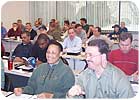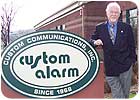
Many dealers and systems integrators are training their technicians in IT networking courses, including those from CISCO Systems.
Network-based technologies are driving the control system industry at lightning speed; they are becoming the backbone of just about every sophisticated security system out there. Dealers and systems integrators who want to evolve along with the technology are hard pressed to stay on top of the changes. Whether seeking out training or certifications, adding staff from the IT sector, or reading anything and everything on the subject, most companies, large and small, know they must surf the network wave competently to stay afloat competitively.
What is your company doing to make sure it is staying up to date on network-based technologies?
“I don’t need to be on the bleeding edge, but do want to be on the leading edge, so we’re very focused on training for our people so they can be competitive,” says Terrence J. Mullett, president and CEO of Trans-Alarm, Burnsville, Minn., who’s putting his entire team through training and believes both sales and technical staff need to be network savvy. “We’ve slated training schedules for this fall and, on the technical side, we’re looking into CISCO programs,” he says. “CISCO is a prominent name in information technology and we’re going to align ourselves with those types of training programs for our sales and technical sales people, including project managers, and for our technical people who actually facilitate the programs in the field.”To stay on top of network-based technologies, Fred Leonardo, president and founder of Electronix Systems Central Station Alarms Inc., Huntington Station, N.Y., is a firm believer in in-house testing. “We test everything here. Most of the guys on staff are self-taught and some have gone to networking schools. They’re all pretty sharp with DVRs and routers. But networking comes with years of practice,” he points out. “Every router is different. You may know the concept but, unfortunately, you have to be a specialist in every product you install today. Twenty-five years ago we’d buy a fire alarm panel out of the box and just plug it in, hook it up and be done. Now it’s all about programming.”
To manage network-based technologies, Leigh Johnson, CEO of Custom Communications Inc., Rochester, Minn., has designated a technologist to specifically supervise that area of the business. “[Our technologist] keeps up to date on all fronts,” he says. “He studies a lot, works closely with vendors and attends their trainings.”
Jason Fischbeck, president and owner of Automated Environments, Mesa, Ariz., also looks to the manufacturers to stay on top of the technology. “We’re looking forward to finding out more from our vendors like DSC and are seeking out education through them.”

Dealers learn to configure networks for security applications at ADI’s IP Security Networking 101 training class in Detroit.
Are you training your existing staff on network technology?
Mullett of Trans-Alarm has sent his techs to PSA Security Network trainings. “Over the last two years, we’ve also sent our senior technicians to IT-based trainings offered through the PSA TECH sessions they have every spring.”“[Our] employees go through industry, national and international training curriculums developed and provided for installation companies,” Perez of Conundrum Technologies says. “These are a mixed collection of manufacturer-based trainings and discipline-based trainings.”
Electronix Systems, which has more than 500 alarm monitoring accounts over the Internet, educates most of its 100 employees in-house. Although some attend the Networking 101 program offered by National Training School and the Microsoft schools for training, Electronix does its own networking and maintains its IT work, according to Leonardo. (National Training School courses provide practical knowledge in Internet Protocol programming, and network and Internet connection of DVRs, network cameras and security equipment.)
The technologist on-staff at Custom Communications Inc., according to Johnson, runs networking schools within the organization. “We have ongoing training for about five people who do networking on a regular basis to keep them up to speed. He’s also been running network training for all our 20 technicians.”
Fischbeck of Automated Environments notes this his company has “done some alarms with IP communicators to program them, but hasn’t done too much to communicate over the network. We can program them remotely but we haven’t done too much reporting over the Internet as most of our accounts are phone-line-based. However, a lot of younger people don’t have landlines in their homes — they have Wi-Fi — so we’re piggy backing on top of them.”
What about certifications?
Trans-Alarm has upcoming meetings set up with CISCO to learn more about what networking certifications are available. Mullett reports that his company has discovered a number of requirements for certifications through the Microsoft Certified Systems Engineer (MCSE) program and NICET.Perez of Conundrum Technologies says that his employees are pursuing JAVA, Apple and CEDIA certifications as well as development trainings.
Leonardo explains that “Our end is security and our concern is getting the alarm through the network and the Internet. We secure alarm certifications and I’m sure there will be some certifications we’ll pursue in networking. New York is pushing for an apprenticeship program. When it comes to doing fire or burg alarms you need to be a specialist in that panel because if you make one programming mistake it’s not going to work properly.”
Fischbeck is open to his technicians earning IT certifications, but he is more aware of educationally based training at this point. “I’m more aware of knowledge-based training but would definitely be open to having techs earn IT certifications,” he says.
Have you hired anyone from outside the security industry (say, in the IT industry)?
While Trans-Alarm has not, most of Conundrum’s programmers have come from the IT industry. Leonardo of Electronix Systems reports that “We probably will hire someone from the IT industry in the future as our network gets bigger and more complicated.”Johnson of Custom Communications echoes that sentiment when he says that, “We’ve looked for more network experience in the last couple of techs we’ve hired. We’re in a rural area so we can’t hire within the industry. But these hires can start with a network and then we can work with them on some of the more intricate stuff like putting the package together.” Fischbeck of Automated Environments also realizes that this industry is merging with the IT industry. “We’d be foolish not to hire people with IT experience, so we’re hiring people with that knowledge and background. Everything in the home controls environment is IP-based we don’t want to be behind the curve,” he says.

Dealers attend ADI’s IP Security Networking 101 training class in Houston to learn the basics of secure networking.
Have you partnered with any IT companies in your area?
Mullett conveys that his company is seeking some very specific alliances with IT companies who can assist in large enterprise systems. “We see it as technical help, but also an expansion of our marketing program. People doing data security have customers we’re not talking to, so we’ll strike those alliances. We’re seeking those alliances and developing partnerships,” he says.Perez says that Conundrum Technologies has partnered with IT companies from time to time, “depending on the scope of the project, level of security and size of the network.”
Johnson’s Custom Communications has what they term “a very good IT company here in town that we’ve done some things with. They do the heavy-duty IT part, because they have all the equipment and it works very well. We can’t be all things to all people.”
Fischbeck’s company has partnered with an IT firm to do its network administration. “For someone to do the configurations of the network, it’d cost $40,000 to 50,000 a year, so we’ve found someone who is good for us, to manage our IT stuff, and we pay him on an hourly basis. We wire the infrastructure, set it up and he comes in and makes the computers talk to us. We don’t want to be responsible for the IT world when the hardware fails. I don’t have the patience. There’s not a whole lot of margins — the risk is too great to sell the computers, so I’d rather have someone do that part of it.”
Have you partnered with any manufacturers or distributors? If so, what types of training and help do they offer to you?
Mullett reports that he does partner with many manufacturers in card access and video markets, which he feels is the forefront toward this surge of convergence. Perez partners with the majority of his manufacturing partners. “They tend to offer product specific trainings, which ultimately crosses over in the specific field unrelated to that product. We have found it very valuable and very efficient,” he says.Johnson and Fischbeck also look to partner with their vendors and distributors because, as Fischbeck states, “I’m a big believer in education. If you’re not learning you’re obsolete.”

Participating in this roundtable discussion are:
Terrence J. Mullett, president and CEO of Trans-Alarm, a subsidiary of Trans-American Security Services Inc. in Burnsville, Minnesota





